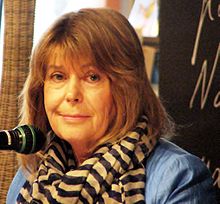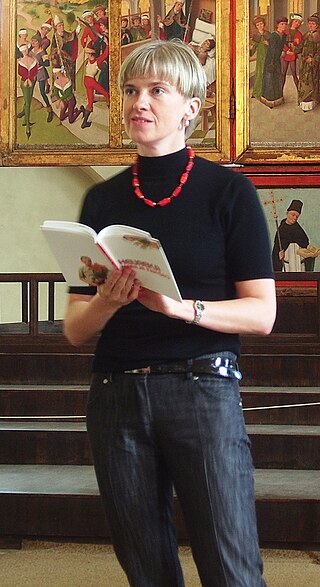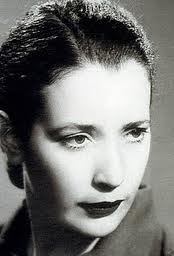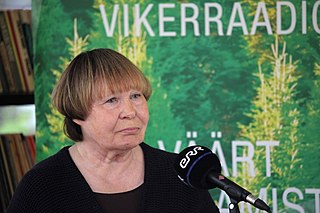
Eeva Park (born September 9, 1950 in Tallinn) is an Estonian writer.

Eeva Park (born September 9, 1950 in Tallinn) is an Estonian writer.
Park was born Eeva Hint in 1950. She is the daughter of writers Aadu Hint and Minni Nurme. After high school she worked as a silk and porcelain painter, and as an archival assistant. She began her career in 1983 as a poet, but soon turned to prose. Her 1993 novel Tolm ja Tuul describes in a fairly obvious way the breakup of his parents' marriage. [1] She is known for her novels' dark undertones, but she has also written plays and short stories, as well as continuing to write poetry. Park has been a member of the Estonian Writers' Union since 1993. In 1994, she received the Friedebert Tuglas Literature Prize. She currently lives in Saku Parish.

Carol Ann Shields was an American-born Canadian novelist and short story writer. She is best known for her 1993 novel The Stone Diaries, which won the U.S. Pulitzer Prize for Fiction as well as the Governor General's Award in Canada.

Grace Nichols FRSL is a Guyanese poet who moved to Britain in 1977, before which she worked as a teacher and journalist in Guyana. Her first collection, I is a Long-Memoried Woman (1983), won the Commonwealth Poetry Prize. In December 2021, she was announced as winner of the Queen's Gold Medal for Poetry.

The Czar's Madman is a 1978 novel by Estonian writer Jaan Kross.

Elo Viiding is an Estonian poet and prose writer.
Josephine Jacobsen was a Canadian-born American poet, short story writer, essayist, and critic. She was appointed the twenty-first Poet Laureate Consultant in Poetry to the Library of Congress in 1971. In 1997, she received the Poetry Society of America's highest award, the Robert Frost Medal for Lifetime Achievement in Poetry.

Estonian literature is literature written in the Estonian language
Mare Kandre was a Swedish writer of Estonian descent. She was born, in Söderala, a small place in mid-Sweden and grew up in Gothenburg and Stockholm. Between 1967 and 1969, she lived with her family in British Columbia, Canada, a period which made a very deep impression on her and later in life influenced her writing. She died of an unintentional prescription drug overdose, aged 42.
Berlie Doherty is an English novelist, poet, playwright and screenwriter. She is best known for children's books, for which she has twice won the Carnegie Medal. She has also written novels for adults, plays for theatre and radio, television series and libretti for children's opera.
Kersti Merilaas was an Estonian poet and translator. In addition, she wrote poems and prose for children and plays.

Maarja Kangro is an Estonian poet, short story writer, novelist, essayist, nonfiction writer and librettist.
Merle Collins is a Grenadian poet, novelist and short-story writer.

Anna Maria Ortese was an Italian author of novels, short stories, poetry, and travel writing. Born in Rome, she grew up between southern Italy and Tripoli, with her formal education ending at age thirteen. Her first book, Angelici dolori, was issued in 1937. In 1953 her third collection, Il mare non bagna Napoli, won the coveted Viareggio Prize; thereafter, Ortese's stories, novels, and journalism received many of the most distinguished Italian literary awards, including the Strega and the Fiuggi. Although she lived for many years in Naples following the Second World War, she also resided in Milan, in Rome, and for most of the last twenty years of her life in Rapallo. L'iguana, Ortese’s best-known work in English translation, was published in 1987 as The Iguana by the American literary press McPherson & Company. As of 2023, what she considered as her most important work, the novel Il porto di Toledo (1975), had not been translated into English yet.

Viivi Luik is an Estonian writer and poet.

Sunita Jain (1941–2017) was an Indian scholar, novelist, short-story writer and poet of English and Hindi literature. She was a former professor and the Head of the Department of Humanities and Social Sciences at the Indian Institute of Technology, Delhi. She published over 80 books, in English and Hindi, besides translating many Jain writings and some Hindi literature into English. She is featured in the Encyclopedia of Post-Colonial Literatures in English and was a recipient of The Vreeland Award (1969) and the Marie Sandoz Prairie Schooner Fiction Award. The Government of India awarded her the fourth highest civilian honour of the Padma Shri in 2004. In 2015 she was awarded the Vyas Samman by the K.K. Birla foundation for outstanding literary work in Hindi. In 2015 she was awarded an honorary D.Litt. from the University of Burdhwan, West Bengal.

Minni Katharina Nurme was an Estonian writer.
Aadu Hint was an Estonian writer. Most of his books are related to people living on Estonian islands.

Herta Leilla Laipaik was an Estonian writer.
Tolm may refer to: